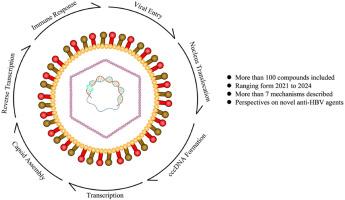当前位置:
X-MOL 学术
›
Eur. J. Med. Chem.
›
论文详情
Our official English website, www.x-mol.net, welcomes your
feedback! (Note: you will need to create a separate account there.)
Novel mechanistic insights – A brand new Era for anti-HBV drugs
European Journal of Medicinal Chemistry ( IF 6.0 ) Pub Date : 2024-09-13 , DOI: 10.1016/j.ejmech.2024.116854 Weiping Lyu , Haoming Qin , Qi Li , Dehua Lu , Cheng Shi , Kangchen Zhao , Shengran Zhang , Ruohan Yu , Huiying Zhang , Xiaonan Zhou , Sitian Xia , Liangren Zhang , Xiaoqian Wang , Xiaowei Chi , Zhenming Liu
European Journal of Medicinal Chemistry ( IF 6.0 ) Pub Date : 2024-09-13 , DOI: 10.1016/j.ejmech.2024.116854 Weiping Lyu , Haoming Qin , Qi Li , Dehua Lu , Cheng Shi , Kangchen Zhao , Shengran Zhang , Ruohan Yu , Huiying Zhang , Xiaonan Zhou , Sitian Xia , Liangren Zhang , Xiaoqian Wang , Xiaowei Chi , Zhenming Liu

|
Hepatitis B Virus (HBV) remains a critical global health issue, with substantial morbidity and mortality. Current therapies, including interferons and nucleoside analogs, often fail to achieve complete cure or functional eradication. This review explores recent advances in anti-HBV agents, focusing on their innovative mechanisms of action. HBV entry inhibitors target the sodium taurocholate cotransporting polypeptide (NTCP) receptor, impeding viral entry, while nucleus translocation inhibitors disrupt key viral life cycle steps, preventing replication. Capsid assembly modulators inhibit covalently closed circular DNA (cccDNA) formation, aiming to eradicate the persistent viral reservoir. Transcription inhibitors targeting cccDNA and integrated DNA offer significant potential to suppress HBV replication. Immunomodulatory agents are highlighted for their ability to enhance host immune responses, facil-itating better control and possible eradication of HBV. These novel approaches represent significant advancements in HBV therapy, providing new strategies to overcome current treatment limitations. The development of cccDNA reducers is particularly critical, as they directly target the persistent viral reservoir, offering a promising pathway towards achieving a functional cure or complete viral eradication. Continued research in this area is essential to advance the effectiveness of anti-HBV therapies.
中文翻译:

新颖的机制见解 – 抗 HBV 药物的全新时代
乙型肝炎病毒 (HBV) 仍然是一个关键的全球健康问题,发病率和死亡率很高。目前的疗法,包括干扰素和核苷类似物,通常无法实现完全治愈或功能性根除。本文探讨了抗 HBV 药物的最新进展,重点介绍其创新作用机制。HBV 进入抑制剂靶向牛磺胆酸钠共转运多肽 (NTCP) 受体,阻碍病毒进入,而细胞核易位抑制剂破坏病毒生命周期的关键步骤,阻止复制。衣壳组装调节剂抑制共价闭合环状 DNA (cccDNA) 的形成,旨在根除持续的病毒库。靶向 cccDNA 和整合 DNA 的转录抑制剂具有抑制 HBV 复制的巨大潜力。免疫调节剂因其增强宿主免疫反应的能力而受到强调,有助于更好地控制和可能根除 HBV。这些新方法代表了 HBV 治疗的重大进步,为克服当前的治疗局限性提供了新的策略。cccDNA 减少剂的开发尤为关键,因为它们直接靶向持续存在的病毒库,为实现功能性治愈或完全根除病毒提供了一条有希望的途径。该领域的持续研究对于提高抗 HBV 疗法的有效性至关重要。
更新日期:2024-09-13
中文翻译:

新颖的机制见解 – 抗 HBV 药物的全新时代
乙型肝炎病毒 (HBV) 仍然是一个关键的全球健康问题,发病率和死亡率很高。目前的疗法,包括干扰素和核苷类似物,通常无法实现完全治愈或功能性根除。本文探讨了抗 HBV 药物的最新进展,重点介绍其创新作用机制。HBV 进入抑制剂靶向牛磺胆酸钠共转运多肽 (NTCP) 受体,阻碍病毒进入,而细胞核易位抑制剂破坏病毒生命周期的关键步骤,阻止复制。衣壳组装调节剂抑制共价闭合环状 DNA (cccDNA) 的形成,旨在根除持续的病毒库。靶向 cccDNA 和整合 DNA 的转录抑制剂具有抑制 HBV 复制的巨大潜力。免疫调节剂因其增强宿主免疫反应的能力而受到强调,有助于更好地控制和可能根除 HBV。这些新方法代表了 HBV 治疗的重大进步,为克服当前的治疗局限性提供了新的策略。cccDNA 减少剂的开发尤为关键,因为它们直接靶向持续存在的病毒库,为实现功能性治愈或完全根除病毒提供了一条有希望的途径。该领域的持续研究对于提高抗 HBV 疗法的有效性至关重要。































 京公网安备 11010802027423号
京公网安备 11010802027423号